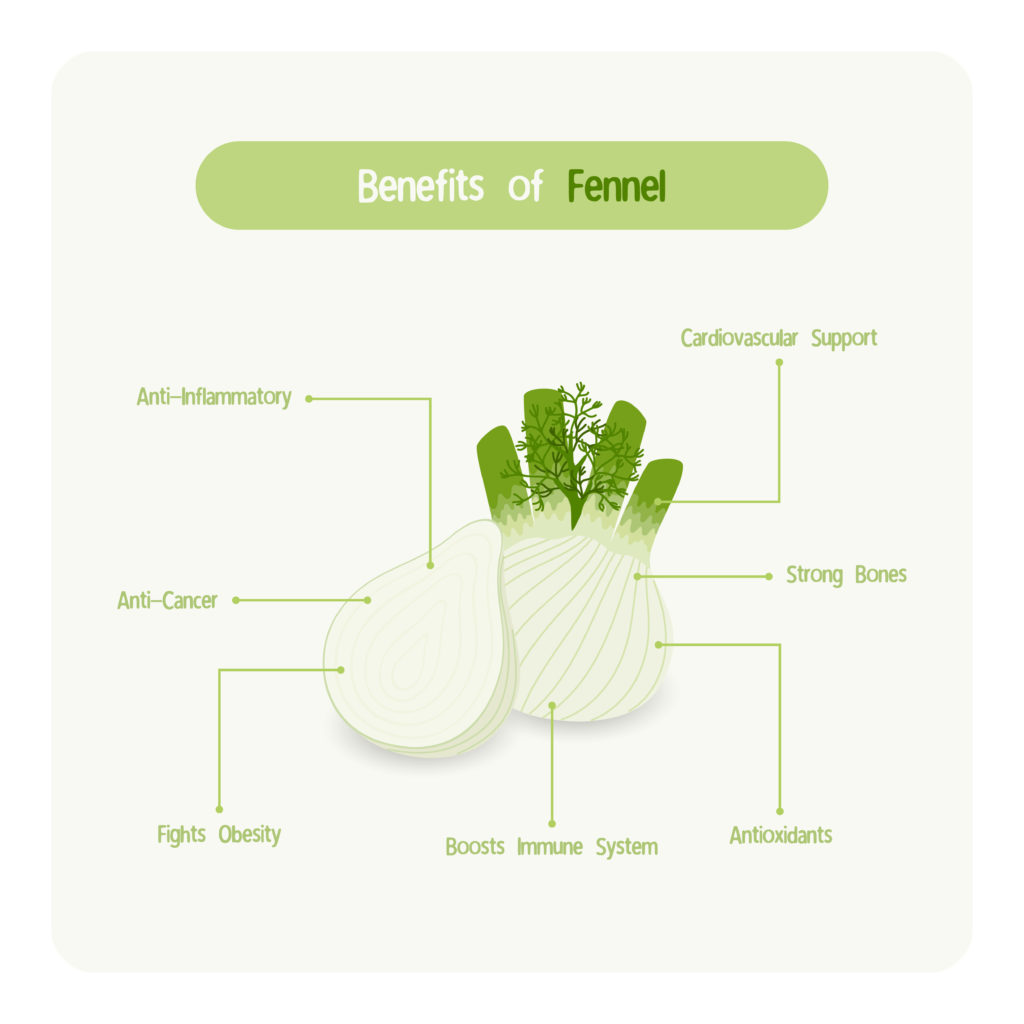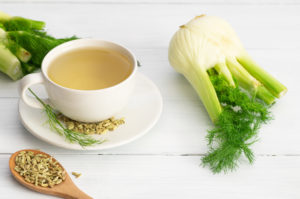What's On This Page?
ToggleFennel can be your stomach’s best friend! It can ease gas, stomach cramping, spasms, bloating and other irritable bowel syndrome (IBS) symptoms, although eliminating food allergies may be the ultimate cure. One reason this herb works so well is because it stimulates the production of bile which helps you digest food, particularly fats. Fennel (Foeniculum vulgare) is an herb that belongs to the carrot family, but it’s not a root vegetable. It is grown and harvested for various parts such as its edible shoots, leaves, and seeds which you can turn into tea. It requires temperate regions to grow (worldwide) and is considered somewhat invasive. It does grow in the USA, I actually grow it in my yard!
Fennel is Nutritionally-Packed
It contains calcium, iron, B vitamins and lots of vitamin C, folic acid and carotenes. It should not surprise you with this type of constitution, it can do more than just soothe your tummy.
A compound in fennel called “anethole” suppresses high levels of an inflammatory chemical called “TNF alpha” and this means that it could relieve pain if consumed regularly; Maybe it could help you with arthritis, fibromyalgia or any TNF-driven pain syndrome.

Carotenoids, anetholes, vitamin C and rutin are a few powerful antioxidants in fennel; these may support your immune system and reduce your risk of cancer and dangerous infections. It may also reduce the frequency of asthma attacks or allergic reactions.
Fennel contains some antioxidants including “caffeoylquinic acids” which according to studies may prevent or reduce the formation of atherosclerotic plaques.
The active compounds have a mild estrogen-like activity and it may promote milk production (lactation) or improve libido. Do not use if pregnant.
But What About Blood Pressure?
Fennel has mild diuretic properties so it may be able to lower blood pressure. It is also a mild appetite suppressant. That combo is a slam dunk if you want to lose a little weight.
Fennel is available in the produce section of most grocery stores. Fennel belongs to the same class of vegetables as celery, and looks very similar with its big white bulb at the bottom and long green stalks. It imparts the flavor of anise, and is the basis for licorice. The fragrant herb is often added to soups and vegetable recipes! You just chop it and use it in your soup, or stir-fry it in oil/butter. See below for another recipe you’ll like.

You can also buy ready-made tea bags or steep your own. Here’s some commercially prepared FENNEL TEA from Amazon.
To steep your own, buy fennel seeds and steep them in boiling water for about 5 minutes. Strain and add honey if desired. This is morning tea because it makes you more alert and in many people, it acts as a mild diuretic.
Like many potent herbs (and medications) there are safety considerations. Don’t supplement with excessive amounts of fennel because it may cause bizarre psychiatric problems (even hallucinations) and also, it can injure muscle tissue. It should be avoided in pregnancy because it can stimulate uterine contractions.
Here’s a recipe you may like, Grapefruit Avocado Fennel Salad.
Did You Know?
Supplements of vitamin K2 may be helpful if you have osteoporosis but ask your doctor because it affects your blood thinning capabilities.

Suzy Cohen, has been a licensed pharmacist for over 30 years and believes the best approach to chronic illness is a combination of natural medicine and conventional. She founded her own dietary supplement company specializing in custom-formulas, some of which have patents. With a special focus on functional medicine, thyroid health and drug nutrient depletion, Suzy is the author of several related books including Thyroid Healthy, Drug Muggers, Diabetes Without Drugs, and a nationally syndicated column.
